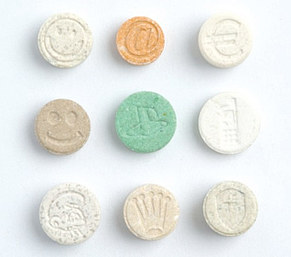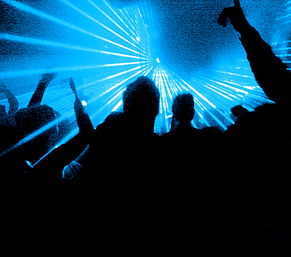Ecstacy


Ecstasy (Methylenedioxymethylamphetamine MDMA)
Street names
Burgers, Disco Biscuits, Doves, Bug Drug, E, Eckies, Echos, Exies, Mitzies, XTC, Diamonds, or identified by design impressed on tablets, e.g. shamrocks and pigs, Mitsubishi logo etc.
General Info
Ecstasy is a stimulant type, class A drug. It is also known by its chemical name, MDMA. Ecstasy is often referred to as being the original designer drug because of its high profile links to dance music culture in the late 80s and early 90s. Clubbers took ecstasy to feel energised, happy, to stay awake and to dance for hours. The effects take about half an hour to kick in and tend to last between 3 to 6 hours, followed by a gradual comedown which can make people feel lethargic and depressed.
A big problem with Ecstasy is that it’s rarely pure. You can’t be sure what’s in it and you can’t predict how you’ll react. Sometimes, there is no MDMA at all. Though a recent study found that in some parts of the country the amount of MDMA in Ecstasy was increasing.
Ecstasy usually comes as flat round tablets in various sizes and colours (but often white), which usually have small motifs embossed on one side. Occasionally, Ecstasy may come as a capsule, which can be yellow, pink or clear and very rarely as powder.
Effects
- Ecstasy makes people feel ‘in tune’ with their surroundings, and can make music and colours more intense
- Users often have temporary feelings of love and affection for the people they're with and for the strangers around them
- Short-term effects of use can include anxiety, panic attacks, confused episodes, paranoia and even psychosis
- Lots of people feel really chatty on E (although these chats don't always make sense to people who aren't on an E)
- Physical side effects can include dilated pupils, a tingling feeling, tightening of the jaw muscles, raised body temperature and the heart beating faster
Risks
- There’s no way of telling what’s in Ecstasy until you've swallowed it. There may be negative side effects from other drugs and ingredients that have been added.
- Long-term users can suffer memory problems, depression or anxiety
- Using Ecstasy has been linked to more frequent colds and sore throats, liver, kidney and heart problems
- Anyone with a heart condition, blood pressure problems, epilepsy or asthma can have a very dangerous reaction to the drug
- There’ve been over 200 ecstasy-related deaths in the UK since 1996.
- Ecstasy affects the body's temperature control which increases the chances of overheating and dehydration when active.
- Ecstasy can cause the body to release a hormone which stops it making urine. Drinking too quickly affects your body's salt balance, which can be as deadly as not drinking enough water. Users should sip no more than a pint of water or non-alcoholic drink every hour.
Class
Class A